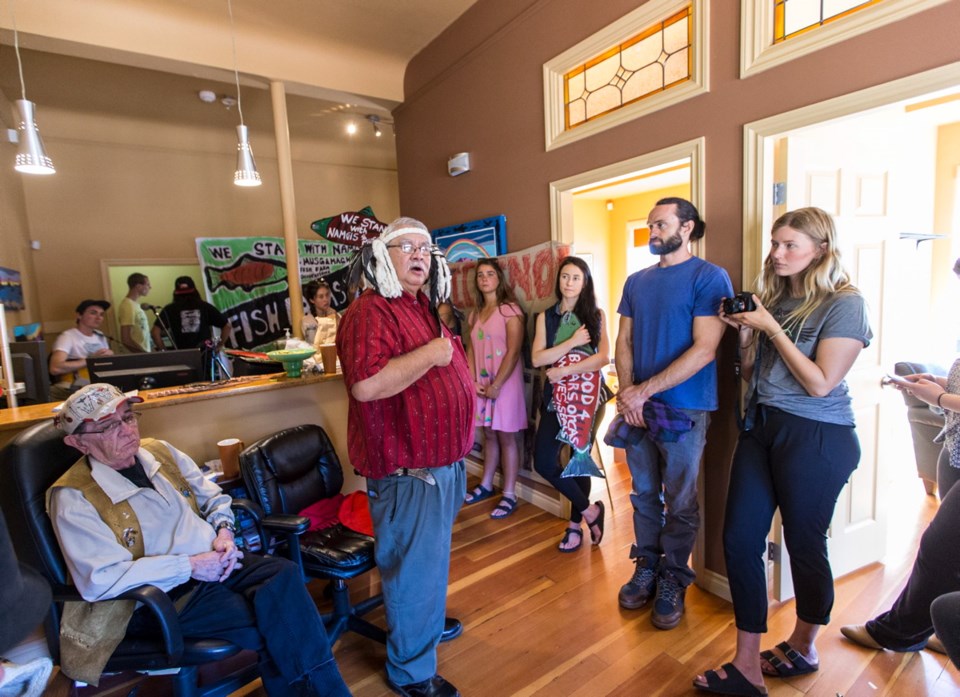First Nations fish-farm opponents and their supporters staged a sit-in at B.C. Agriculture Minister Lana Popham’s office Thursday, protesting farms in the Broughton Archipelago.
About 30 protesters arrived at the Quadra Street office of Popham, MLA for Saanich South, to show solidarity with First Nations occupying Marine Harvest fish farms at Swanson and Midsummer islands, off northeast Vancouver Island.
The Musgamagw, ‘Namgis, and Mamalilikulla First Nations are calling for an end to open-pen fish farms in the waters of the archipelago, which they have fished for generations.
Opponents believe aquaculture operations, which largely raise Atlantic salmon, devastate wild stocks by transferring disease and parasites. Open-net systems allow water to flow freely between pens holding farmed fish and the natural marine environment.
Provincial permits that allow those farms to operate should be pulled immediately, Ernest Alfred, a hereditary chief from the Namgis, Lawit’sis and Mamalilikulla nations, said in a telephone interview from Swanson Island.
Tsastagilas (Dawna Amber) of ‘Namgis said in Popham’s office: “If we lose our salmon, we lose our culture. It is such an important part of it.”
Tsawout hereditary Chief Eric Pelkey joined the protest saying, “We stand beside all the other First Nations who are taking a stand against fish farms in their territories.
“Fish farms are killing our wild salmon.”
Popham was at the Union of B.C. Municipalities convention in Vancouver and could not immediately be reached.
She said in a statement, “Our government is deeply committed to protecting B.C.’s wild salmon. It’s essential to our economy, to our province, and to B.C’s First Nations.
“We are committed to implementing the recommendations of the Cohen Commission aimed at protecting sockeye salmon in the Fraser River.
“We hear and understand the concerns being raised by First Nations and members of the public.”
Popham said she is committed to working with First Nations, the aquaculture industry, and Fisheries and Oceans Canada “to ensure B.C.’s aquaculture sector is environmentally sustainable and respects First Nations’ rights while continuing to provide good jobs for British Columbians.”
Negotiation is the best way to resolve issues, she said.
As well, an advisory council report on finfish aquaculture is expected to go to Popham this fall.
Protests come as the salmon farming industry comes off a banner year. Its 2016 export values reached a record high in B.C.
A consultant’s report for the B.C. Salmon Farmers Association said the industry has 2,966 direct employees and last year’s wholesale value of its salmon is estimated at $796.6 million.
Association members have 106 of the 109 licensed and tenured finfish aquaculture facilities in B.C. About 60 to 70 are normally operating, according to the association.
The sit-in in Saanich was part of planned escalating protests. Another was planned in the Port Alberni office of Scott Fraser, minister of Indigenous relations and reconciliation.
These protests follow decades of opposition to fish farms along B.C.’s coast. In 2003, a flotilla of protest boats arrived at a Broughton Archipelago fish farm to serve an eviction notice.



